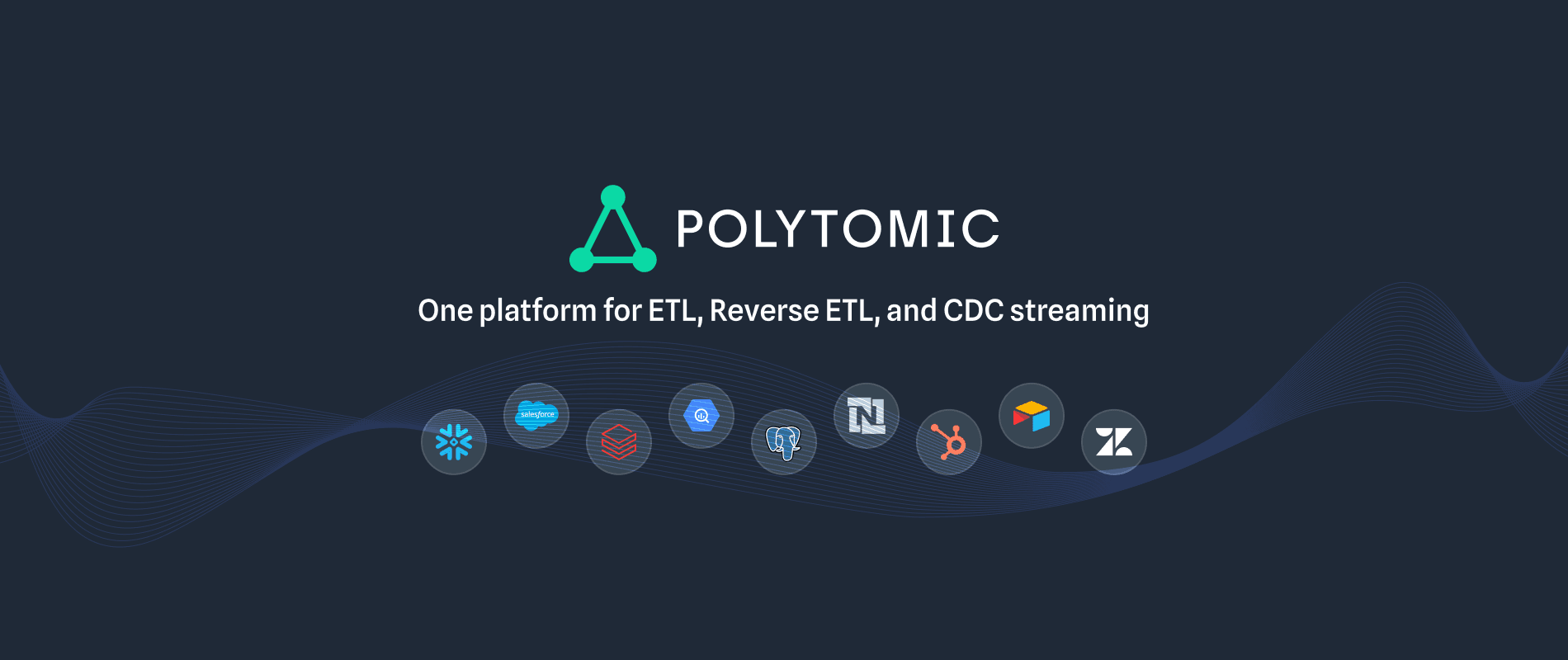Top 6 Matillion Alternatives & Competitors
Matillion is a cloud-native ETL/ELT platform that enables data teams to build and manage pipelines across cloud data platforms like Snowflake, Redshift, BigQuery, and Azure Synapse, offering a low-code interface and push-down transformations for efficient data processing.

What is Matillion?

Matillion
Matillion is a cloud-based ETL/ELT solution designed to help data teams create and oversee data pipelines across various cloud data platforms, including Snowflake, Redshift, BigQuery, and Azure Synapse. It features a low-code interface and supports push-down transformations, ensuring efficient and streamlined data processing.
Key Features
- Sync to data warehouses (ETL/ELT)
- UI-based User Experience
Limitations
- Challenging version control and limited visibility of change logs
- Outdated point-and-click interface
- Supports only ETL, lacking Reverse ETL capabilities
- Expensive for the features offered
Pricing
Polytomic utilizes a usage-based pricing structure, allowing customers to buy credits that can be used across its suite of services, including ETL, ELT, CDC streaming, and Reverse ETL. The cost is influenced by several factors, such as the number of data syncs performed and the volume of data transferred. Pricing is also affected by the scale of deployment, the duration of data processing tasks, and the level of support needed. This flexible model ensures that users only pay for the resources they actually use, making it a cost-effective solution for businesses of all sizes.
Why Consider Matillion Alternatives
While Matillion is a well-known ETL tool, it has its limitations that drive users to seek alternatives. Here are some reasons why companies consider other options:
- Difficult version control and visibility of change logs: Matillion's version control capabilities are limited, making it challenging to track changes and maintain a clear history of modifications.
- Legacy point-and-click interface: The user interface can feel outdated and cumbersome, slowing down the workflow for more advanced users who prefer modern, streamlined tools.
- Only ETL (no Reverse ETL): Matillion focuses solely on moving data into your warehouse, lacking the ability to send data back to tools like Salesforce or HubSpot. This forces users to manage additional tools for Reverse ETL needs.
- High cost for features: The pricing for Matillion can be steep, especially when considering the features offered. This can be a significant drawback for companies looking to optimize their budget.
Below is a table breaking down six alternatives to Matillion and their tradeoffs.
Feature-by-Feature Breakdown: Alternatives & Competitors
































































































Top 6 Matillion Alternatives & Competitors
Polytomic
Data teams appreciate our single ETL platform with unified monitoring to centralize all data movement. We have full SQL support and first-class support for infrastructure-as-code.
RevOps and marketing teams use our no-code UI to quickly and independently set up syncs for product data to their CRM and ad platforms.
Built for enterprise scale, Polytomic can be self-hosted, handles billions of rows reliably, and has multi-tenant workspaces with fine-grained access controls.
















All the features you need, on the platform that does it all
Replace multiple vendors
Reduce costs and simplify workflows
One platform for all syncs
ETL, Reverse ETL, CDC, iPaaS, APIs, and spreadsheets
Sync only what's changed
Save on API limits and compute costs
Point and click
Select and filter your data without writing code
SQL query support
Powerful transformations when you need them
Pull from any API
No more glue code for custom integrations
Self-hosting available
Turnkey deployment to your private cloud
Enterprise-ready
SOC 2, GDPR, permissions, and audit logs
Integrated with your favorite tools
Sync any of your proprietary data from databases, data warehouses, and spreadsheets to the business systems you use.








Pricing begins at $500/month
Standard
Everything in Basic, plus:
- Sync to and from databases, warehouses, spreadsheets, apps, and APIs
- Unlimited users and connections
- Multiple sync destinations
- Live chat support with engineers
Enterprise
Everything in Standard, plus:
- On-prem deployment
- Single sign-on (SSO)
- Dedicated engineer
- Phone support

Airbyte
Airbyte is a versatile open-source data integration platform aimed at centralizing data across warehouses, lakes, and databases. It provides various options such as Airbyte Cloud for rapid deployment, Airbyte Self-Managed Enterprise for robust data security, and Airbyte Open Source, trusted by more than 40,000 organizations. This flexibility makes it a go-to solution for diverse data integration needs.

Key Features
- Transfer data from various systems to data warehouses (ETL)
- Extensive range of built-in connectors
- Self-service capabilities
- Vibrant open-source community
Limitations
- Many connectors are only “community-supported”
- Complicated setup procedures
- Fragile and underdeveloped at scale
- Incapable of transferring data from warehouses to SaaS applications (No Reverse ETL)
Pricing
Airbyte provides several pricing tiers to cater to different needs. Their offerings include a free Open Source plan for those who prefer self-hosting, a Cloud plan that charges based on data volume, and Team and Enterprise plans that are capacity-based. Each plan differs in hosting options, sync frequency, and additional features. The Cloud plan may incur additional costs for more frequent syncs, while the Team and Enterprise plans come with various add-ons to enhance functionality.

Hightouch
Hightouch is a reverse ETL and AI platform tailored for marketing and personalization, empowering businesses to extract insights, execute campaigns, and develop AI-driven agents using their data. It features an AI Decisioning Platform for lifecycle marketing and a Composable Customer Data Platform (CDP) that is adaptable, secure, and rapidly deployable, all built on top of a data warehouse.

Key Features
- Sync data with Reverse ETL
- Emphasis on AI features and marketing personalization
- Free tier to get started
Limitations
- Does not support syncing to data warehouses (No ETL)
- Excess features and pricing for just Reverse ETL
- Lack of unlimited workspaces
Pricing
Hightouch provides a Starter Plan that includes a free tier at no cost and a paid tier priced at $350 per month, billed annually with a 20% discount. For larger organizations, the Business Plan offers custom pricing designed to meet specific requirements, featuring unlimited user seats and advanced personalization options.

Fivetran
Fivetran is a widely-used ETL solution designed to transfer data from various sources such as SaaS applications, databases, and files into data warehouses including Snowflake, BigQuery, Databricks, and Redshift. It automates the data integration process, ensuring that data is consistently and accurately moved to the desired destination, enabling businesses to focus on analysis rather than data pipeline maintenance.

Key Features
- Widely-known ETL vendor
- Large number of built-in connectors
- Plug-and-play syncing into data warehouses
- Simple to use for smaller businesses
Limitations
- Unable to sync back into SaaS applications (no Reverse ETL)
- Frequent price increases
- High cost at medium scale and beyond
- Limited and unreliable customer support
- Slow response to new connector requests
Pricing
Fivetran provides several pricing tiers to accommodate different needs. Their Free Plan is available at no cost, while the Standard Plan is priced at $500 per million monthly active rows (MAR). For more extensive requirements, the Enterprise Plan costs $667 per million MAR, and the Business Critical Plan is set at $1,067 per million MAR. As of March 2025, Fivetran's bulk sync discounts are applied on a per connector basis rather than across the entire workspace, which has led to higher costs for many users.

Hevo Data
Hevo Data is a no-code platform designed for ETL processes, enabling users to seamlessly extract, transform, and load data from more than 150 different sources. This tool simplifies data integration, making it accessible for users without technical expertise to manage complex data workflows efficiently.

Key Features
- ETL data integration for syncing to data warehouses
- Works well at sub 5 million rows/month
- 150+ data sources
- Free tier available at small scale
Limitations
- Issues with scalability even at 5 million rows/month
- Slow support (even the Enterprise plan only offers 1hr support SLA)
- Unreliable for critical infrastructure
- No Reverse ETL offered
Pricing
Hevo Data’s pricing structure is well-suited for companies with modest data requirements. They provide a generous free tier that allows up to 1 million events to be synced each month. For those needing more, their starter plan ranges from $299 to $949 per month, accommodating between 5 and 50 million monthly synced events. Additionally, Hevo offers Professional and Business Critical plans that come with enhanced features for more demanding data needs.

Census
Census is a Reverse ETL tool designed to transfer data from your data warehouse to various SaaS applications, including Salesforce, Hubspot, and advertising platforms. This enables businesses to leverage their data more effectively by ensuring that critical information is consistently updated across all operational tools.

Key Features
- Sync from data warehouse to tools (Reverse ETL)
- Workspaces
- White-label API
Limitations
- Limited number of synced fields for Professional plan
- Pricing model not based on scale (per field pricing)
- Enterprise plan needed for syncs more frequent than 15 minutes
- Inability to sync to data warehouses (No ETL/ELT)
Pricing
Census offers three main pricing plans: the limited free plan, a Professional plan starting at $350/month, and custom Enterprise plans. The Enterprise plan is required for real-time sync capabilities and their “Audience Hub” features.
Why customers are switching to Polytomic
Polytomic combines ETL and Reverse ETL in a single platform so you can move data to and from your data warehouse without managing brittle pipelines across multiple tools.
- Easy for RevOps: Point-and-click pipelines with power-user features like real-time SOQL transformations on Salesforce.
- Loved by Data teams: High-scale CDC streaming, full SQL support, Terraform integration, and a white-label API with native clients.
- Enterprise-ready: Multi-tenant workspaces, fine-grained RBAC, and 50–70% cost savings from platform consolidation. Plus, support from real US-based engineers—in minutes, not days.
Get hands-on with Polytomic
See how easy it is to sync data to the tools your team actually uses—no code, no waiting.
